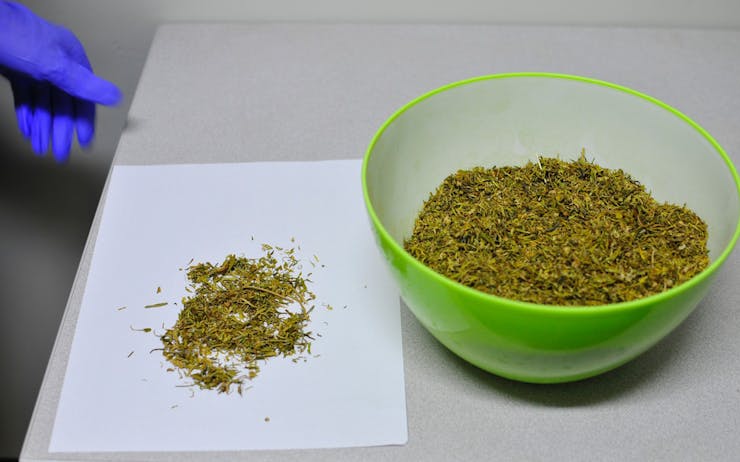Take a second to appreciate this picture.
If you’ve seen cannabis before, we’ll forgive you for not recognizing it here.
That bowl of what looks like stuff you might dig out of an old lawnmower is actually government-approved medical marijuana. Since the 1960s, the United States has required that all cannabis used for research be sourced through the government.
And there it is, in all its glory.
No joke. The cannabis in that picture, the Washington Post reports, is the federally approved cannabis distributed to Sue Sisley, a researcher conducting a first-ever clinical trial of cannabis as a potential treatment for post-traumatic stress disorder (PTSD). To underscore the difference between government marijuana and the medical cannabis familiar to patients in most legal states, the Post published this side-by-side comparison:

(Washington Post)
“Inhaling that would be like eating an apple, including the seeds inside it and the branch it grew on,” professional cannabis critic Jake Browne told the Post. “People typically smoke the flower of the plant, but here you can clearly see stems and leaves in there as well.”
Or as Twitter user @lightningjeff put it, “That’s drug abuse right there on the right.”
“It's akin to investigating the effects of bourbon by giving people Bud Light.”
The PTSD researcher, Sisley, said she was disappointed when she first unwrapped the package. “It didn’t look like cannabis. It didn’t smell like cannabis,” she told PBS NewsHour, which described the substance’s as looking “like green talcum powder.”
Some of the samples Sisley received failed to conform to the chemical potency she’d requested for the study, she said. One strain, for example, was supposed to contain 13% THC. Sisley’s testing showed it was closer to 8%.
Other samples were contaminated with mold and yeast at levels that exceeded standards in adult-use states like Washington or Colorado.
The cannabis was, like all government-approved cannabis, grown on a 12-acre farm at the University of Mississippi, overseen by the National Institute on Drug Abuse. And while it may be a laughable product, it’s hardly a laughing matter.
“For a researcher, it’s difficult to assess the real-world impact of high-end pot if you only have access to the low-quality stuff,” write the Post’s Chris Ingraham and Tauhid Chappell. “It’s akin to investigating the effects of bourbon by giving people Bud Light.”
NIDA has said it plans to produce “some additional marijuana this year and harvest some high THC material that will likely be above 13 percent THC.”




